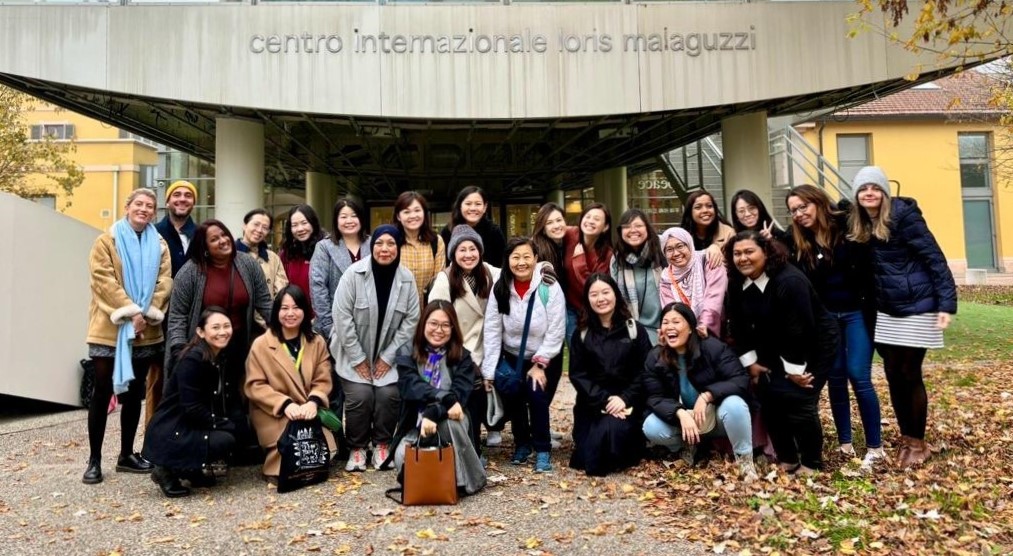
Visiting the city of Reggio Emilia, including the infant-toddler centers, preschools, and the Loris Malaguzzi International Center, has always been a dream of mine.
When we talk about Reggio Emilia, we are talking about its people, its city, its town square, the piazza. Talking about Reggio Emilia involves reflection, commitment, and responsibility within its rich socio-cultural context. It’s a conversation about passion for education, a dialogue about love and respect for children and childhood.
In the prologue of the first Spanish edition of ‘In Dialogue with Reggio Emilia’ by Carla Rinaldi, Tulia Gómez and Juan Carlos Melo point out that “Engaging in a dialogue with the Reggio experience means listening to the wisdom with which we are all endowed from the beginning of life—believers in the uniqueness and unrepeatable nature of each being, competent and rich.”
I recently had the privilege of being nominated and sponsored to attend and be part of the REACH Study Group in Reggio Emilia, allowing me the opportunity to visit this special city. With attention and curiosity, although briefly, I was able to immerse myself intensely, delving into its culture and thoughts.
Beyond education, discussing Reggio Emilia involves a conversation about art and architecture. While walking through the streets of Reggio Emilia, one cannot help but marvel at the special light reflected in the earthy and pastel facades characteristic of Emilia-Romagna. With it, the streets are flooded with lights and shadows, creating a serene and joyful atmosphere that stimulates thought and creativity.
To understand the philosophy and pedagogical approach of Reggio Emilia it is important to empathize and be familiar with the socio-cultural context of the city—past, present, and future.
In her book ‘In Dialogue with Reggio Emilia,’ Carla Rinaldi fondly recalls the words spoken by Professor Bruner upon receiving Reggio citizenship in the Tricolore room in 1997.
[…] What I discovered here was still a profound surprise to me. Not only did the famous preschools deserve their worldwide reputation, but they had secret qualities that could only be discovered by coming here to see them on the spot, in situ. For this wonderfully creative schools do not exist in a vacuum. They are part of, an expression of, this wonderful small city.
Reggio Emilia, when you come to know it, is a city that takes pride in community. It is a city whose citizens respect each other, a city that believes in using both intelligence and compassion in solving its community problems, and above all, believes deeply in quality. […]
According to Jerome Bruner, the relationship between local culture and the educational project of Reggio Emilia was one of the most significant subjects of research. In the final chapter of the book In Dialogue with Reggio Emilia Carla Rinaldi observes that “Reggio itself is an interpretation of Reggio!”
Therefore, it is essential to highlight two key concepts: context and community.
Each school has its context and community, and the Infant-toddler centers and preschools of Reggio Emilia are unique to the city. However, this doesn’t mean that this pedagogical approach cannot be implemented and advocated outside of Reggio. Of course, it can. The key is to adapt it to the diverse socio-cultural contexts in which our educational centers operate. The essence lies in transferring and sharing the learning and knowledge acquired in Reggio Emilia to the context of our schools.
“Dealing with Education is not a technical issue. Taking care of Education is a great Political job.” Daniela Lanzi
As Daniela Lanzi stated in her conference on day 1, educators, pedagogistas and atelieristas do not attend the international study group to copy a model, but to find ideas, evocations, and suggestions that are useful for our context. Every educational project is contextual.
On the other hand, it is worth highlighting the importance and the feeling of community, collaboration, and participation. As Daniela Lanzi points out, an educational project is not individual but shared. She emphasizes the importance of sharing co-responsibility, stating: ‘Co-responsibility is not a particularly fashionable word; it is a difficult one. Co-responsibility requires participation; it is a form of communal solidarity with the cultural legacy. Daniela Lanzi affirms that society can only progress if it believes in the term and meaning of the concepts of solidarity and responsibility.
In this manner, by acknowledging the school as the social context that it is, atelierista, pedagogista, and educators must consistently collaborate and reflect, documenting the concepts and learning that are unfolding.
“Adults and children building a living landscape together.” Daniela Lanzi
Reflection by:
Jon Solaun
Atelierista
EtonHouse International School Sentosa